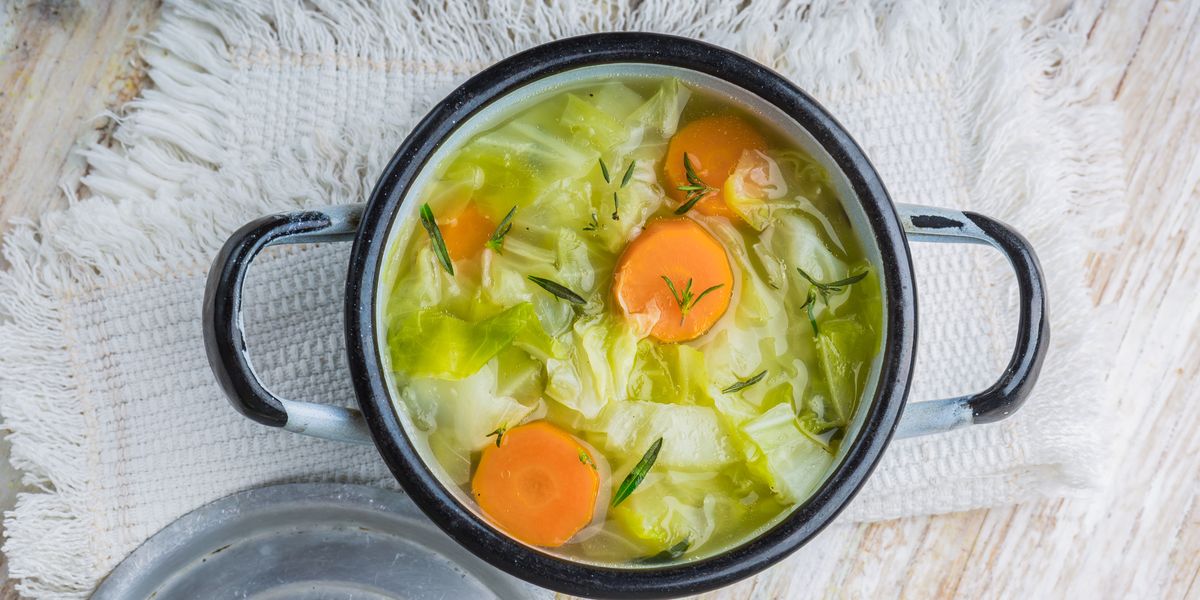
Much like TV spoilers, it’s hard to miss the chat around the cabbage soup diet – or the hype around the ‘so-called’ health benefits (read: an easy way to lose weight).
The cabbage soup diet, you won’t be surprised to learn, is a diet that consists mainly of eating cabbage (alongside other veggies, such as; onions, tomatoes or tomato juice, celery and carrots). You can expect to consume unlimited cabbage soup along with, well, not much else.
Eager to find out how this diet works – and what sets it apart from other diets? Keep scrolling for everything you need to know…
Meet the experts: Priya Tew is a specialist dietitian from Dietitian UK and Hannah Alderson is a registered nutritionist and hormone specialist.
What is the cabbage soup diet?
Priya Tew, a specialist dietitian from Dietitian UK, describes the cabbage soup diet as: ‘A short-term weight loss fad diet where you eat mainly cabbage soup for 10 days. Some versions of the diet allow you to eat a few other foods such as fruit and dairy too’.
Essentially, it’s a diet that involves consuming a low-calorie cabbage soup as the main component of your meals. Often promoted as a quick way to lose weight, the diet originally gained popularity in the 1980s and has since resurfaced (yes, the #CabbageSoupDetox started trending on TikTok at the end of last year).
‘The cabbage soup diet is a highly restrictive seven-day diet with no scientific backing,’ adds registered nutritionist and hormone specialist Hannah Alderson. ‘It hit the mainstream in the 80s and had its time back in the spotlight in the late 90s and early 00s (I was there and did in fact do this diet) and sadly it’s gaining popularity again. It all centres around a soup recipe that is lacking in protein and good healthy fats.’
What does the cabbage soup diet look like?
Day 1: Unlimited cabbage soup and fruit but no bananas.
Day 2: Only soup and vegetables with a focus on raw or cooked leafy greens. Avoid peas, corn, and beans. You may also have one baked potato with butter or oil.
Day 3: Eat as many fruits and vegetables as you want in addition to the soup. However, no baked potatoes or bananas.
Day 4: Unlimited bananas, skimmed milk, and cabbage soup.
Day 5: You can eat 10–20 ounces (280–567 grams) of beef, which you may substitute for chicken or fish. You may also have up to six fresh tomatoes. Drink at least 6–8 glasses of water.
Day 6: Soup, beef, and vegetables. You may substitute beef for broiled fish if you did not do so the day prior. Focus on leafy greens — no baked potatoes.
Day 7: You may have vegetables, brown rice, and unlimited fruit juice — but no added sugar.
Does the cabbage soup diet work?
‘This diet can lead to fast, short-term weight loss,’ says Tew – since you tend you lose weight when you eat less calories and restrict your diet (and the cabbage soup diet is incredibly low on calories). ‘However, the weight that you lose is not going from your fat mass but your carbohydrate stores and fluids,’ she adds. ‘Therefore it is not going to be sustainable. As soon as you start eating a normal diet again you are going to put this weight back on, plus potentially more. This means in the longer term this is not a diet that leads to weight loss.’
Alderson agrees: ‘If you are using weight as a measure of success, sure you may see some immediate weight loss on a scale but I can assure you that this will mainly be water, and potentially lean muscle. It does not work as a long-term fat loss solution as this is not a sustainable eating pattern.’
Is the cabbage soup diet healthy?
Pew strongly warns against trying the cabbage soup diet for health reasons: ‘This diet is unbalanced and will not provide all the nutrients you need. Cutting out major foods groups is not a good idea and can lead to you being deficient in some nutrients. Whilst cabbage is great, too much of anything in our diets is not a good idea. It is also known to be a diet with side effects of lots of wind.’
‘I personally would not recommend anyone uses a diet like this unless there is a specific medical reason,’ adds Pew. ‘These types of diets are unbalanced, they do not make nutritional sense and can lead to disordered eating or even an eating disorder.’
Alderson reiterates this, saying the cabbage soup diet is for ‘no one – particularly those with hormonal dysfunction, who are pregnant, breastfeeding or with a history of disordered eating.’
‘What this diet is, is a fad in its greatest form,’ she adds. ‘I can safely say that any type of extreme, fad dieting WILL NOT give you lasting results. It can sadly drive hormonal dysfunction.
‘As a woman who once tried this diet when I was struggling with weight management due to PCOS, I would say you’re more likely to lose friends than lbs as your house stinks of cabbage and you’re likely to see an increase in fluctuance.’
Key takeaway? If you fancy cabbage soup, make a batch and style it with healthy fats and protein and enjoy it as part of a diverse diet.
Cut through the noise and get practical, expert advice, home workouts, easy nutrition and more direct to your inbox. Sign up to the WOMEN’S HEALTH NEWSLETTER
